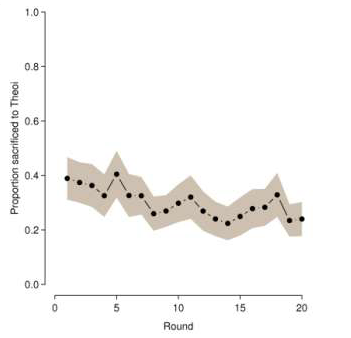Religion can be a pain in the backside. What with all those prayers and religious meetings – not to mention all the more tangible sacrifices of money and (sometimes) goats.
It’s enough to make an evolutionary psychologist scratch their head and go “hmmm”. Why should people go to all that effort? What’s in it for them?
One theory is that it signals to others that they are ‘true believers’, and so can be trusted. Another holds that beliefs that are ‘demonstrated’ by expensive behaviour are more likely to be believed, and so transmitted.
One idea that’s received surprisingly little attention is that people may simply believe that they get a direct payoff from their sacrifice. They make an offering to their god, and god returns the favour by fixing that business deal (or making the rains come on time).
Paul Frijters, of the University of Queensland, and Juan Barón, at Australian National University, have run a series of studies on university students to investigate this.
It was a two-phase game. In the first phase, the students earned some points. For example, in one variant, they played a ‘public good’ game where everyone contributes anonymously to a central pot, which is then increased and shared equally. The best thing to do is to contribute nothing, and hope that everyone else contributes a lot. But if everyone does that, then no-one takes home much.
Then these points were turned into hard cash, at a rate determined by ‘Theoi’ (represented on a computer). Now, they didn’t know the rules that Theoi used to do this, but they were given the opportunity to contribute some of their points to Theoi, if they so chose.
This cycle was repeated over 20 rounds, and the student’s task was to figure out the optimal contribution to make to Theoi in order to maximise their payout.
Now, what the students didn’t know is that Theoi in fact just worked at random. The amount they contributed (or ‘sacrificed) to Theoi had no effect whatsoever on the outcome.
 |
| Contributions to Theoi as a percentage of Phase 1 earnings. |
Despite this fact, the level of sacrifice to Theoi was remarkably resilient. Although it did decrease as the rounds wore on, it did not decrease by much – and nearly half the students were sacrificing just as much at the end of the experiment as they were at the start.
There were some interesting tweaks. They tried giving the students access to everyone else’s decisions and results. That was a large pool of data – more than enough for them to figure out that Theoi was just acting randomly. But still they didn’t figure it out. In fact, those students who spent longer puzzling over it actually tended to then sacrifice even more!
When they renamed ‘Theoi’ as ‘Weather’, however, the level of sacrifice dropped more quickly. This suggests that anthropomorphisation is important.
What this study shows is that these students seem inherently resistant to learning that the forces at work are random. They started off with the assumption that Theoi would reward sacrifices, and they just didn’t seem able to shake that assumption, despite all the evidence.
So who sacrificed most? Academic discipline didn’t matter – engineers, artists, scientists, all sacrificed about the same.
Nor did religious or superstitious beliefs have any effect on the amount sacrificed. Perhaps that’s because Theoi was clearly not really a god or supernatural in any way. They were just trying to second-guess the experimenter’s fiendish mind.
Women maintained their level of sacrifice more than men. People with lucky charms, or a high sense of self-control (“locus of control”) reduced their level of sacrifice more quickly.
The most significant factor was the amount contributed in Round 1, the “Public Good” game. The people who contribute most in this game are those people who have faith in communal cohesion – that their good deed will be reciprocated. However, I have doubts about whether this effect is real. Fritjers & Baron measured sacrifices as a percentage of winnings in round 1. The people who contributed most in round 1 would also leave it with the fewest points. Perhaps that affected their decision on what proportion to sacrifice.
Still, this is a very interesting study, even though it’s clearly an artificial set-up. What it’s really testing is people’s ability to see the randomness when they’re expecting their sacrifices to have some effect. What it shows is that these students were not very good at this task!
Really they want to believe in Theoi, despite all the evidence to the contrary. And for of them, that conviction seemed nearly impossible to shake.
Paul Frijters, Juan D. Barón. The Cult of Theoi: Economic Uncertainty and Religion. IZA DP No. 4902. April 2010
 This article by Tom Rees was first published on Epiphenom. It is licensed under Creative Commons.
This article by Tom Rees was first published on Epiphenom. It is licensed under Creative Commons.













